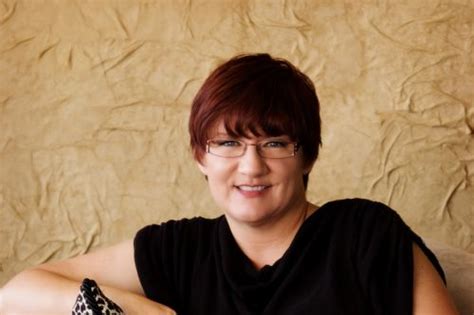A Quote by Edna O'Brien
Life, after all, was a secret with the self. The more one gave out, the less there remained for the center--that center which she coveted for herself and recognized instantly in others. Fruits had it, the very heart of, say, a cherry, where the true worth and flavor lay. Some of course were flawed or hollow in there. Many, in fact.
Related Quotes
She had been innocent once, a little girl playing with feathers on the floor of a devil's lair. She wasn't innocent now, but she didn't know what to do about it. This was her life: magic and shame and secrets and teeth and a deep, nagging hollow at the center of herself where something was most certainly missing.
Woman must come of age by herself. This is the essence of 'coming of age'-to learn how to stand alone. She must learn not to depend on another, nor to feel she must prove her strength by competing with another. In the past, she has swung between these two opposite poles of dependence and competition, of Victorianism and Feminism. Both extremes throw her off balance; neither is the center, the true center of being a whole woman. She must find her true center alone. She must become whole.
She realized how many of her beliefs were either unrealistic or belonged to her deceased parents and her ex-husband. She also realized that her expectations for herself and others were sometimes too rigid. She was trying to live up to what everyone else said was best for her, which made her depressed and hard to be around at times. Once she changed her beliefs about herself and others, she began to smile more and enjoy life.
The other me, who did not mean to drown herself, went under the sea and remained there for a long time. Eventually she surfaced near Japan and people gave her gifts but she had been so long under the sea she did not recognize what they were. She is a sly one. Mostly at night we commune. Night. Harbinger of dream and nightmare and bearer of omens which defy the music of words. In the morning the fear of her going is very real and very alarming. It can make one tremble. Not that she cares. She is the muse. I am the messenger.
... there had been the two little boys. Now they were gone, too. They loved her and called her and sent her e-mails and would still snuggle up to her to be petted when they were in the mood, but they were men, and though they would always be at the center of her life, she was no longer at the center of theirs.
Some leave our life with tears, others with an insane frigidity; Mrs. Wilcox had taken the middle course, which only rarer natures can pursue. She had kept proportion. She had told a little of her grim secret to her friends, but not too much; she had shut up her heart--almost, but not entirely. It is thus, if there is any rule, that we ought to die--neither as victim nor as fanatic, but as the seafarer who can greet with an equal eye the deep that he is entering, and the shore that he must leave.
Yet there were times when he did love her with all the kindness she demanded, and how was she to know what were those times? Alone she raged against his cheerfulness and put herself at the mercy of her own love and longed to be free of it because it made her less than he and dependent on him. But how could she be free of chains she had put upon herself? Her soul was all tempest. The dreams she had once had of her life were dead. She was in prison in the house. And yet who was her jailer except herself?
During intermission she peeked out at the theater, watching it refill. When it was almost full and the lights blinked on and off, she saw three people file in through the center door and her breath caught. Time lapsed as they walked down the center aisle: three teenage girls all in a row. They were so big, so bright, so beautiful, so magnificent to Carmen’s eyes that she thought she was imagining them. They were like goddesses, like Titans. She was so proud of them! They were benevolent and they were righteous. Now, these were friends.
[Keeping kosher was] the symbol of an initiation, like the insignia of a secret brotherhood, that set her apart and gave her freedom and dignity. Every law whose yoke she accepted willingly seemed to add to her freedom: she herself had chosen . . . To enter that brotherhood. Her Judaism was no longer a stigma, a meaningless accident of birth from which she could escape . . . It had become a distinction, the essence of her self-hood, what she was, what she wanted to be, not merely what she happened to be.
In the sacred fact of obligation you touch the immutable, and lay hold, as it were, on the eternities. At the very center of your being, there is a fixed element, and that of a kind or degree essentially sovereign. A standard is set up in your very thought, by which a great part of your questions are determined, and about which your otherwise random thoughts may settle into order and law.
For with eyes made clear by many tears, and a heart softened by the tenderest sorrow, she recognized the beauty of her sister's life—uneventful, unambitious, yet full of the genuine virtues which 'smell sweet, and blossom in the dust', the self-forgetfulness that makes the humblest on earth remembered soonest in heaven, the true success which is possible to all.
although she went home that night feeling happier than she had ever been in her short life, she did not confuse the golf course party with a good party, and she did not tell herself she had a pleasant time. it had been, she felt, a dumb event preceded by excellent invitations. what frankie did that was unusual was to imagine herself in control. the drinks, the clothes, the instructions, the food (there had been none), the location, everything. she asked herself: if i were in charge, how could i have done it better?





































